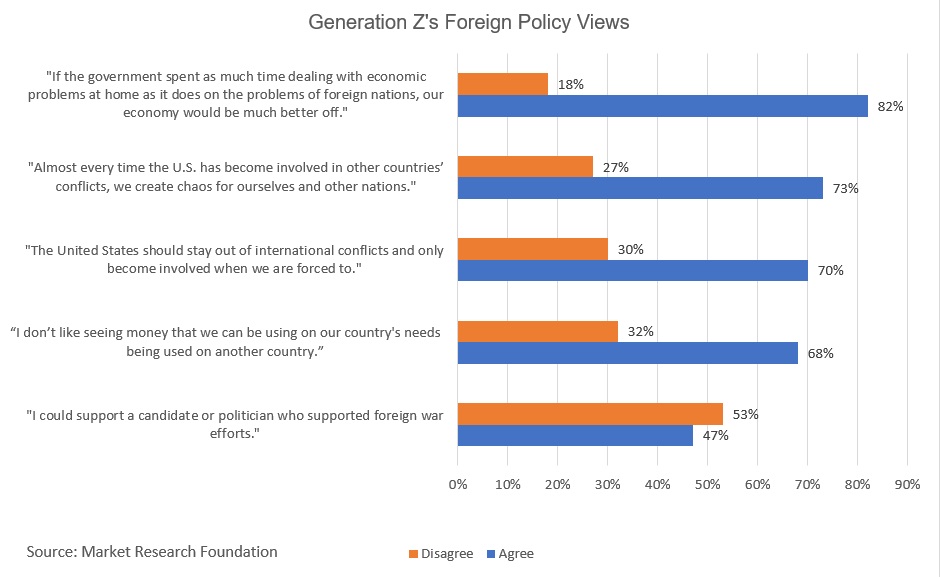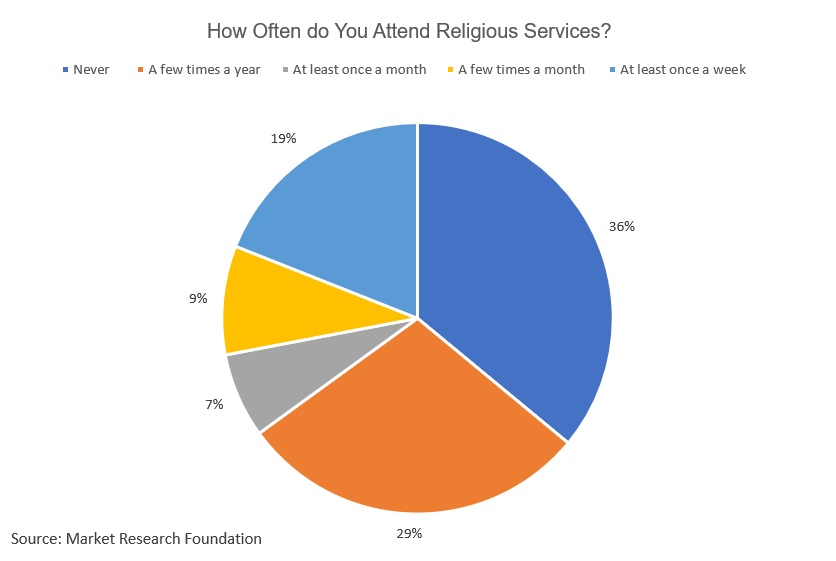By Bill Wilson
A new Wall Street Journal/NBC News poll is being trumpeted by the mainstream media as proof that Generation Z is less patriotic and less religious than older generations. The pollsters asked age groups to rank how important vague, entirely subjective terms like ‘patriotism’ and ‘religion’ are to Americans, and concluded that young people are unpatriotic and apathetic about faith. While throwing a collection of key words at a group and asking them to rank them in importance generates clickbait headlines for left-leaning media, it isn’t particularly insightful or relevant when trying to understand the views of young Americans.
Market Research Foundation conducted an in-depth survey of Generation Z this spring, and gathered nuanced responses to specific policy goals that we believe are more useful than asking young people to react to politically-loaded key words.
Are Young People Really Less ‘Patriotic’?
The left loves to talk about trigger words, and for once that rhetorical framework might prove moderately useful. Asking people to respond to a word as politically-charged and vague as ‘patriotism’ is not likely to yield useful data. The word is entirely subjective, and could call to mind all manner of government corruption and state-sanctioned violence. Just because younger Americans are less likely to adorn themselves with the word patriotic, does not mean they oppose real-world patriotic policy goals that put the needs of Americans first.
We asked young people their views on an “America First” policy agenda where, “the primary goal of any law or policy must be to focus on the needs of Americans, even if they are not in line with the interests of foreign nations and allies.” When asked this direct question, 73% of Generation Z approved of this policy agenda.
We also found that questions framed in terms of the financial tradeoff between domestic economic concerns and intervening in foreign affairs earned overwhelming support for non-interventionalist policies. Eighty-two percent of young people agreed with the statement: “If the government spent as much time dealing with economic problems at home as it does on the problems of foreign nations, our economy would be much better off.” Sixty-eight percent of young people agreed with the statement: “I don’t like seeing money that we can be using on our country’s needs being used on another country.” Below is a summary of young people’s views on specific detailed statements and policies involving the United States in relation to other nations.
It is abundantly clear from this data that a majority of Generation Z holds strong anti-foreign aid and anti-foreign meddling stances that are the embodiment of patriotism – focusing on solving issues at home instead of policing the globe.
Are Young People Really Less ‘Religious’?
Another conclusion from the poll spreading like wildfire through online-political discourse is that young Americans are less ‘religious’ than older generations. While that makes for a neat narrative and a share-friendly headline, this is incorrect when measuring actual church attendance, as shown below.
Overall, 64% of Generation Z attends religious services at some point during the year. Those who do attend religious services are significantly more likely to attend often than they are to attend occasionally. Our survey also found that race is an important factor in understanding Generation Z’s religious participation. Among Black young people, a full 70% attend religious services at least sometimes and among Hispanic young people 67% attend religious services sometimes while 63% of White young people attend religious services sometimes, and 19% attend at least once a week.
The poll’s rankings give at best a cursory overview of young people’s knee-jerk reactions to politically-loaded key words, but the questions lack the context and specifics to yield a meaningful understanding of Generation Z’s values. Ask a sixteen-year-old, a thirty-year-old, and a 60-year-old what ‘patriotism’ actually means to them, and you’re getting closer to something relevant. Ask the same people what they think about specific, detailed policy proposals like avoiding international conflicts and putting America first, and you’re going to get even closer.
Bill Wilson is the President of the Market Research Foundation and a former board member and former President of Americans for Limited Government.








